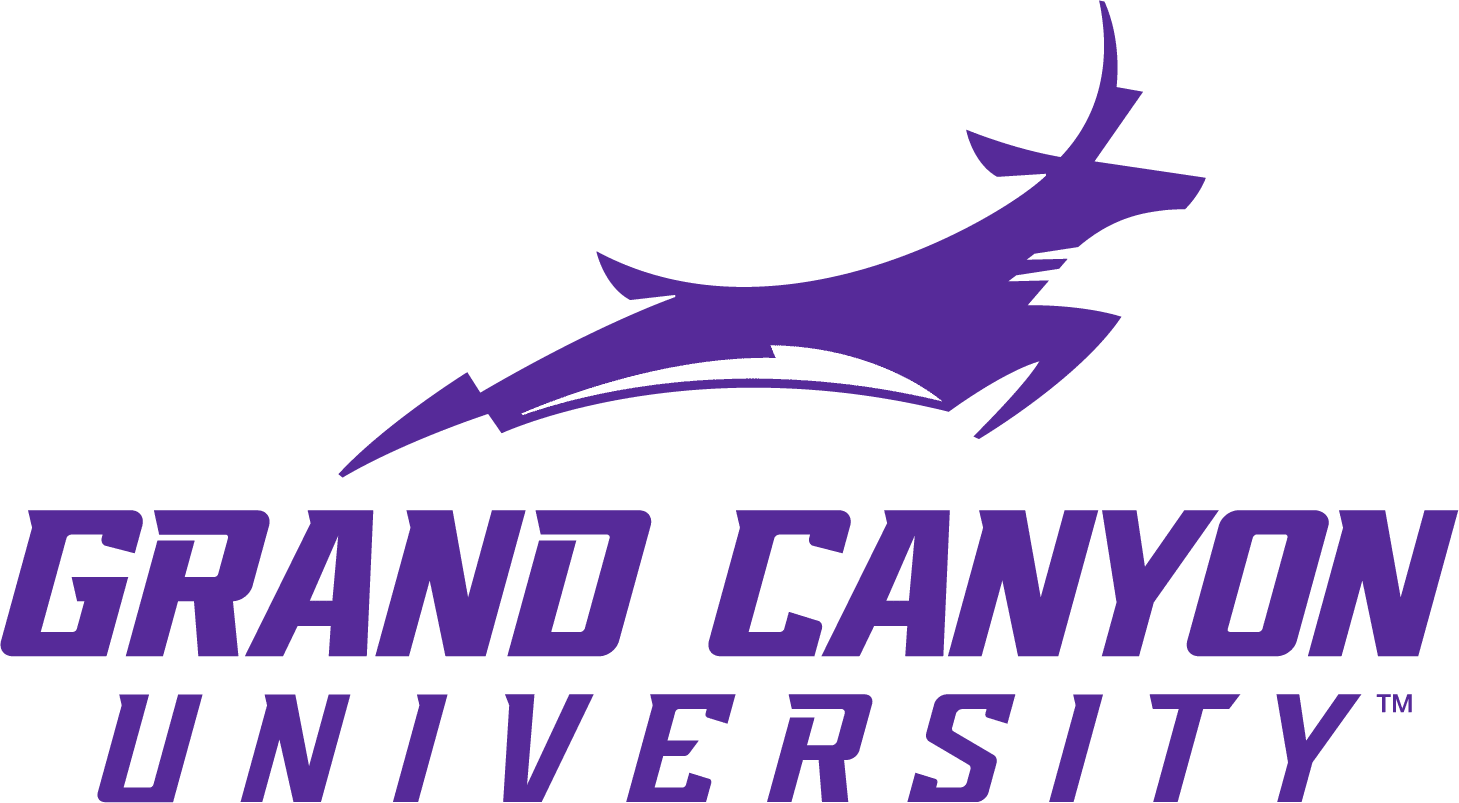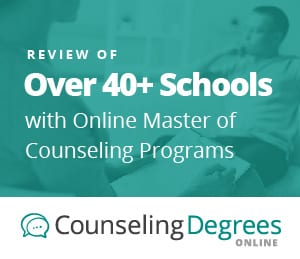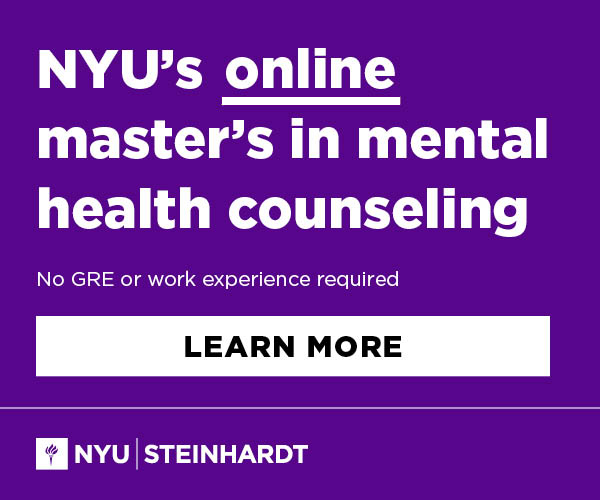 Walden University : MS Dual Degree in Clinical Mental Health Counseling and School Counseling (CACREP Accredited, six specializations to choose from)
Walden University : MS Dual Degree in Clinical Mental Health Counseling and School Counseling (CACREP Accredited, six specializations to choose from) Walden University : MS in School Counseling (CACREP Accredited)
Walden University : MS in School Counseling (CACREP Accredited) Liberty University : MED: School Counseling (Online with required intensives)
Liberty University : MED: School Counseling (Online with required intensives) Grand Canyon University : Master of Education in School Counseling (Take the next step toward excellence with a master's degree in Education from GCU.)
Grand Canyon University : Master of Education in School Counseling (Take the next step toward excellence with a master's degree in Education from GCU.) The Chicago School : Ph.D. in Counselor Education and Supervision (Online Programs.)
The Chicago School : Ph.D. in Counselor Education and Supervision (Online Programs.) University of Denver : Master of Arts in School Counseling (No GRE required)
University of Denver : Master of Arts in School Counseling (No GRE required) University of Wisconsin – Superior : MSE Counseling - School Counseling Track (100% Online, No GRE Required)
University of Wisconsin – Superior : MSE Counseling - School Counseling Track (100% Online, No GRE Required) Arkansas State University : MSE School Counseling - Crisis & Trauma Concentration (100% Online, No Teaching Experience Required)
Arkansas State University : MSE School Counseling - Crisis & Trauma Concentration (100% Online, No Teaching Experience Required) Arkansas State University : MSE School Counseling - Special Populations Concentration (100% Online, No Teaching Experience Required)
Arkansas State University : MSE School Counseling - Special Populations Concentration (100% Online, No Teaching Experience Required)Step-by-Step Guide to Becoming a School Counselor
1. Earn a Bachelor’s Degree in a Related Field
To begin your path to becoming a school counselor, earning a bachelor’s degree is the first essential step. While any undergraduate major can technically qualify, degrees in psychology, education, social work, or counseling (including online counseling bachelor’s degrees) can provide a solid foundation in understanding behavioral science, mental health, and student development.
2. Complete a Master’s Degree in School Counseling
Most states require aspiring school counselors to complete a master’s degree in school counseling or a closely related field. In these graduate programs, students learn counseling theories, student support strategies, and techniques for working with diverse student populations. Programs typically include coursework, supervised practice, and an internship experience in a school setting.
3. Obtain Relevant State Licensure or Certification
School counselor licensure and certification requirements vary by state. In many cases, graduates need to pass a state-approved examination and complete a period of supervised experience to qualify. This step ensures that counselors are well-prepared to support students within a structured, regulated framework. Always check your state’s specific requirements to determine the exact licensing criteria.
4. Complete Supervised Practicum and Internship Hours
Hands-on experience is vital for school counselors. Most master’s programs in school counseling include a supervised practicum and internship, where students work directly with K-12 students under the guidance of an experienced counselor. These experiences are designed to give future school counselors real-world practice in supporting students’ academic, emotional, and social growth.
5. Consider Additional Certifications or Specializations
While not always required, additional certifications or specializations can enhance your qualifications. For example, some school counselors pursue certifications in areas like college and career readiness, mental health, or behavioral interventions. These certifications not only strengthen a counselor’s skill set but also improve their employability in specialized school settings.
6. Seek Employment and Continue Professional Development
With the right qualifications in place, you’re ready to pursue employment as a school counselor. School counselors are in demand in both public and private schools across the country. Once employed, counselors often engage in ongoing professional development through workshops, courses, and professional organizations to maintain their licensure and stay current on educational trends and techniques.
School Counselor Education
A graduate degree is essential for becoming a school counselor, typically requiring a master's degree in school counseling or a closely related field. Here, we’ll explore key aspects of the education path, from degree types to program accreditation, to help you understand what to expect in an academic setting.
Degree Programs for School Counseling
To pursue a career as a school counselor, prospective students typically enroll in a Master of Education (M.Ed.), Master of Science (M.S.), or Master of Arts (M.A.) in School Counseling. These programs are specifically designed to prepare students for the multifaceted role of a school counselor and generally include both theoretical coursework and hands-on experience in schools.
Accreditation of School Counseling Programs
Accreditation is a critical factor when selecting a graduate program. Look for programs accredited by the Council for Accreditation of Counseling and Related Educational Programs (CACREP), a widely recognized body for counseling programs. A CACREP-accredited degree often meets the educational standards required for licensure and can streamline the path to becoming a school counselor in many states.
Formats of School Counseling Programs
School counseling master’s programs come in various formats to accommodate different learning styles and scheduling needs:
- On-Campus Programs: Traditional programs offer in-person classes and resources at a physical campus.
- Online Programs: Many institutions provide online options, ideal for students who need flexibility. Be sure to verify if online programs include required in-person components, such as practicums and internships.
- Hybrid Programs: These combine online learning with occasional in-person sessions, providing a blend of flexibility and hands-on experience.
Typical Curriculum for School Counseling Programs
The curriculum of school counseling programs covers a broad range of subjects to prepare counselors for the diverse needs of students. Core courses often include:
- Counseling Techniques and Theory: Fundamentals of counseling approaches and practical skills.
- Human Development and Learning: Understanding student growth and development across age ranges.
- Ethics and Professional Issues: Guidelines for maintaining ethical practices in school counseling.
- Career and Academic Counseling: Preparing students for future educational and career paths.
- Multicultural Counseling: Approaches for working with students from diverse backgrounds.
In addition to coursework, most programs require a supervised practicum and internship in a school setting, where students gain direct experience working with children and adolescents.
Consider a Featured Online Counseling Program
| School and Program Information | Online Program? Entry Requirements |
Course Information |
|---|---|---|
| Walden University
MS Dual Degree in Clinical Mental Health Counseling and School Counseling
 CACREP Accredited CACREP Accredited |
✔ Online
GRE scores not required |
The counseling field is in need of qualified, compassionate professionals like you to meet the demand for services. In Walden's clinical mental health counseling and school counseling dual degree program, you’ll gain the insights and hands-on training to positively impact the lives of children, adults, and families. Learn More |
| Walden University
MS in School Counseling
 CACREP Accredited CACREP Accredited |
✔ Online
GRE scores not required |
School counselors help students overcome obstacles and shape successful futures. Walden’s online MS in School Counseling program will give you a solid foundation in school counseling theories, approaches, and best practices while enabling you to gain hands-on experience. Learn More |
| Liberty University
MED: School Counseling
 CACREP Accredited CACREP Accredited |
✔ Online
Online with required intensives |
Liberty University’s CACREP-accredited Master of Education (M.Ed.) in School Counseling can help equip you to work as a school counselor in Christian, public, and private schools. Online and on campus. Training Champions for Christ since 1971. Learn More |
| Grand Canyon University
Master of Education in School Counseling
NASAC Accredited |
✔ Online
|
At GCU, school-counselors-in-training candidates develop into more than school counselors, they grow into compassionate, servant leaders with strong ethics and morals to positively make a greater difference in communities and the lives of children. Learn More |
| The Chicago School
Ph.D. in Counselor Education and Supervision
|
✔ Online
Master's Degree Required. |
The online Ph.D. in Counselor Education and Supervision program prepares graduates to act as educators and leaders in the field of counseling. Ph.D. Supervision students engage in the evaluation of theoretical and practical aspects of counseling through both qualitative and quantitative research. Learn More |
| University of Denver
Master of Arts in School Counseling
Designed to adhere to CACREP standards |
✔ Online
No GRE Required; Minimum GPA 2.5 Required |
Earn a Master’s degree in School Counseling online from the University of Denver. Learn from doctoral-level faculty in live classes and gain experience through mock counseling and in-field training. No GRE required. Complete in as few as 24 months. Learn More |
| University of Wisconsin – Superior
MSE Counseling - School Counseling Track
|
✔ Online
100% Online, No GRE Required |
Aligned to state law and accreditation standards, our programs equip you with the academic and professional development that will prepare you for the Wisconsin and/or Minnesota counseling licensure exams. Designed for teachers and nonteachers, this program provides the professional development and practical experience you need to enrich your counseling acumen and grow your impact on students' wellbeing. Learn More |
| Arkansas State University
MSE School Counseling - Crisis & Trauma Concentration
|
✔ Online
100% Online, No Teaching Experience Required |
Learn to foster the mental health wellbeing of K-12 students who have experienced life-changing traumatic events. Gain the specialized knowledge and tools you need to be fully qualified in supporting students from all backgrounds. Learn More |
| Arkansas State University
MSE School Counseling - Special Populations Concentration
|
✔ Online
100% Online, No Teaching Experience Required |
Designed to intentionally hone your expertise in specific subgroups, this master's program online equips you to counsel K-12 students facing distinctive challenges. Areas of focus include special education, gifted and talented, and English as a second language. Learn More |
*Sponsored Counseling Programs
Online CACREP Accredited programs | Online MPCAC Accredited programs
School Counselor Professional Licensing and Certification
Licensing and certification requirements for school counselors vary significantly depending on the state and the educational institution. Most states and employers require that school counselors obtain a specific credential or certification beyond their degree to ensure they’re equipped to meet students' needs effectively. Here are the common requirements prospective school counselors can expect to encounter:
State Licensure Requirements
Many states require school counselors to be licensed or certified through the state’s department of education. Although specifics can vary, the requirements generally include:
- Master's Degree in School Counseling: This degree ensures that candidates have specialized training in counseling theory, child and adolescent psychology, and practical experience in school settings.
- Fieldwork Experience: Most states require 500 to 700 hours of supervised clinical experience in a school setting, which is usually part of the master’s program. This hands-on training provides real-world experience working with students and school staff.
- State Exam: Some states require candidates to pass an examination that assesses knowledge and skills related to counseling practice. These exams may vary by state, with some states utilizing exams like the Praxis for School Counselors or state-specific assessments.
National Certifications
While state licensure is typically required, school counselors may also seek national certification, which can enhance job prospects and demonstrate a commitment to the profession:
- National Certified School Counselor (NCSC): Offered by the National Board for Certified Counselors (NBCC), the NCSC certification is for counselors who have completed a master’s degree and met specific supervised experience requirements. Candidates must also pass the National Counselor Examination (NCE) and the National Certified School Counselor Examination (NCSCE).
- Optional Certification for Career Advancement: Obtaining national certification is not required by all states or employers but can provide a competitive edge in the job market and facilitate licensure portability if relocating.
Renewal and Continuing Education
School counseling licenses and certifications often require renewal every few years. To maintain licensure or certification, counselors typically need to complete continuing education courses or professional development activities, ensuring they stay current on best practices in student support and counseling techniques.
How Long Does It Take to Become a School Counselor?
The time required to become a school counselor depends on several factors, including educational background, state requirements, and whether one pursues full-time or part-time studies. Here’s a general timeline for prospective school counselors to consider:
Bachelor’s Degree – 4 Years
A bachelor’s degree is a prerequisite for admission to most master’s programs in school counseling. While a specific major isn’t required, degrees in psychology, education, or social work provide a strong foundation for counseling studies.
Master’s Degree in School Counseling – 2 to 3 Years
Most states require a master’s degree specifically in school counseling. These programs typically take 2 to 3 years of full-time study and include coursework in counseling theories, developmental psychology, and educational policies, along with a supervised practicum.
Field Experience – Concurrent with Master’s Program
During the master’s program, students complete a supervised internship in a school setting, usually ranging from 500 to 700 hours. This hands-on experience can extend a student’s time in the program but is crucial for licensure readiness.
Licensure and Examination – Varies by State
After completing educational requirements, candidates may need to pass state exams or the Praxis for School Counselors, depending on local requirements. Preparing for and scheduling these exams can add several months to the timeline.
Total Time Commitment: 6 to 8 Years
The typical path to becoming a licensed school counselor takes around 6 to 8 years, considering both undergraduate and graduate education. However, part-time study or additional internships may lengthen this timeline.
For students exploring how long it takes to become a school counselor, it’s essential to check specific state and program requirements, as these can influence the total time investment.
Job Outlook and Salary for School Counselors
The demand for school and career counselors is expected to grow by 4% from 2023 to 2033, which aligns with the average growth rate for all occupations, according to the U.S. Bureau of Labor Statistics (BLS). This growth reflects the expanding need for support in academic development, social adjustment, and career planning within schools.
Each year, approximately 29,100 job openings for school and career counselors are projected, largely due to the need to replace counselors who transition to different roles or retire. As more schools emphasize mental health support and academic guidance, counselors will continue to play a crucial role in helping students navigate personal and academic challenges.
In terms of salary, school and career counselors earned a median annual wage of $61,710 in May 2023, though salaries vary significantly by workplace setting and geographic location. Here’s a breakdown of median annual wages in May 2023 across top employment settings:
- Elementary and Secondary Schools (Local): $73,520
- Elementary and Secondary Schools (Private): $60,700
- Other Private Educational Services: $56,670
- Junior Colleges, Colleges, and Universities (State and Local): $55,070
- Junior Colleges, Colleges, and Universities (Private): $51,760
Counselors working within elementary and secondary schools, particularly public schools, tend to earn the highest salaries, given the increased demand for comprehensive student support in these environments.
 Walden University - MS in School Counseling (CACREP Accredited)
Walden University - MS in School Counseling (CACREP Accredited)
 Liberty University - MED: School Counseling (CACREP and NCATE through CAEP Accredited)
Liberty University - MED: School Counseling (CACREP and NCATE through CAEP Accredited)
 Grand Canyon University - Master of Education in School Counseling (NASAC Accredited)
Grand Canyon University - Master of Education in School Counseling (NASAC Accredited)
 The Chicago School - Ph.D. in Counselor Education and Supervision (WASC and WSCUC Accredited)
The Chicago School - Ph.D. in Counselor Education and Supervision (WASC and WSCUC Accredited)
FAQ on Becoming a School Counselor
What degree do I need to become a school counselor?
To become a school counselor, you typically need a master’s degree in school counseling, psychology, or a related field. This degree prepares you with the necessary counseling skills, knowledge of educational systems, and practical experience through supervised internships or fieldwork.
How long does it take to become a school counselor?
The timeline varies but generally takes 6-7 years. This includes earning a bachelor’s degree (4 years) and then a master’s degree in school counseling (2-3 years). Some states may also require additional post-master’s training or supervised experience before full certification.
Is licensure required to work as a school counselor?
Yes, most states require school counselors to be licensed or certified. Requirements typically include a master’s degree, supervised experience, and passing relevant exams. Be sure to check your state’s specific licensure requirements, as they can vary.
What is the difference between a school counselor vs. school psychologist?
While both roles support student well-being, they focus on different aspects. School counselors primarily assist with academic guidance, social skills, and college or career planning. School psychologists, however, often provide psychological assessments, behavioral intervention plans, and mental health support, focusing on students with specific emotional or behavioral needs.
Can I become a school counselor with an online degree?
Yes, many accredited programs offer online degrees in school counseling. However, keep in mind that most programs require in-person fieldwork or internships to gain hands-on experience. Ensure any online program you choose meets state licensure requirements.
Do school counselors work year-round?
School counselors typically follow the school calendar, which means they may have summers off. However, some counselors, especially those in year-round schools or certain administrative roles, may work throughout the year.
Moving Forward with Your School Counseling Career
Becoming a school counselor is a meaningful path that requires dedication, education, and a commitment to student success. From guiding students’ academic journeys to providing emotional support, school counselors play a vital role in educational environments. As you consider your career and educational goals, remember to thoroughly research degree programs, licensure requirements, and the specific needs of the schools or districts where you’d like to work. Choosing the right program and planning your pathway carefully can set you up for a rewarding career supporting students’ growth and achievement.

 University of Denver - Master of Arts in School Counseling
University of Denver - Master of Arts in School Counseling University of Wisconsin – Superior - MSE Counseling - School Counseling Track
University of Wisconsin – Superior - MSE Counseling - School Counseling Track Arkansas State University - MSE School Counseling - Crisis & Trauma Concentration
Arkansas State University - MSE School Counseling - Crisis & Trauma Concentration








